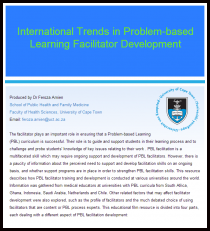
This image by University of Cape Town is under a Creative Commons license CC BY-NC-ND 2.5.
The facilitator plays an important role in ensuring that a Problem-Based Learning (PBL) curriculum is successful. Their role is to guide and support students in their learning process and to challenge and probe students' knowledge of key issues relating to their work. PBL facilitation is a multifaceted skill which may require ongoing support and development of PBL facilitators. However, there is a paucity of information about the perceived need to support and develop facilitation skills on an ongoing basis, and whether support programs are in place in order to strengthen PBL facilitation skills. This resource describes how PBL facilitator training and development is conducted at various universities around the world. Information was gathered from medical educators at universities with PBL curricula from South Africa, Ghana, Indonesia, Saudi Arabia, Netherlands, and Chile. Other related factors that may affect facilitator development were also explored, such as the profile of facilitators and the much debated choice of using facilitators that are content or PBL process experts.
Author: Dr. Feroza Amien
Institution: University of Cape Town

This image by University of Cape Town is under a Creative Commons license CC BY-NC-ND 2.5.
Jump to:
| Document Title | Creator | Downloads | License |
|---|---|---|---|
|
International Trends in Problem-based Learning Facilitator Development |
Feroza Amien
|



